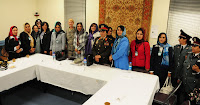
For the past week, we’ve been escorting a crew from CBS’s 60 Minutes around Kabul as they work on story on the Afghan National Police. We’ve been everywhere; Central Training Center, Camp Phoenix, the Afghan National Police Academy, ANP headquarters in Kabul; you name it, if it had to do with police, these guys wanted to film it. It was a nice chance for me to get some photos too since pretty much everywhere we went, they were putting on the show for the big time media.
From South Africa and Australia, the film crew was a fun group; most of the journalists and photographers we’ve had out here are and I can imagine why - they have the coolest job; traveling around the world, documenting stories and amazing events and getting paid to do it. Sort of like being in Public Affairs, but with more money, more freedom and civilian clothes. So almost.
On the third day out the film crew wanted to get the Kabul police chief on patrol so we headed to the streets of Kabul, where of course, a big crowd gathered in minutes. It’s usually the kids first, and today was no different. Two little boys immediately came up to the vehicle windows and started trying to get our attention.
While I find it extremely sad to see little kids playing or going through garbage, I don’t like to give them money, no matter how much they beg. I’m sure they all have the phrase, “Missus, missus, one dollar, you give me one dollar” memorized because that’s all they seem to say, over and over. I know people hand out money but I can’t do it; it doesn’t teach them anything, the other kids might beat them up and take their money and it just encourages them to ask for more. Not to mention, you’ll have every kid in a two-block radius begging you in a matter of minutes.
But these two little boys were being relatively well-behaved and were asking for food so my co-workers and I gave them some snacks we had and a couple of bottles of water. While they were quiet about their prize, it was inevitable that other kids would find out and come running. Sure enough, five more kids came over trying to beg for money or sell us trinkets and gum. After awhile, they ran off, but the first two boys stayed and after sneaking them some lollipops, I started to play a combo of hide n’ seek and tag with them. They were laughing and having fun, and it was nice to see them taking the time out to be kids because I imagine their childhood doesn’t allow much room for playfulness. There is something about interacting with the Afghan children that brings out your protective insticts; they have so little disregard for their own safety, health and well-being; it makes you just want to take care of them. I tried to clean their hands and faces with the baby wipes I always carry and the 'What is THIS?' look on their faces was almost comical.
After awhile it was time for us to leave, but I managed to get a few pictures of them playing first. I don’t know if those two kids will remember us but I hope that whatever comes their way, they remember there are decent people in the world.


